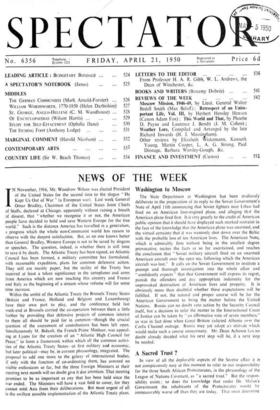NEWS OF THE WEEK
IN November, 1916, Mr. Woodrow Wilson was elected President of the United States for the second time to the slogan " He Kept Us Out of War " (a European war). Last week General Omar Bradley, Chairman of the United States Joint Chiefs of Staffs, declared at Chicago, apparently without raising a breath of dissent, that " whether we recognise it or not, the American people have decided to hold and save Western Europe for the free world." Such is the distance America has travelled in a generation, a progress which the whole non-Communist world has reason to observe with the deepest satisfaction. But, as no one knows better than General Bradley, Western Europe is not to be saved by slogans or speeches. The question, indeed, is whether there is still time to save it by deeds. The Atlantic Treaty has been signed, an Atlantic Council has been formed, a military committee has formulated, with reasonable expedition, plans for common defensive action. They still are mainly paper, but the reality of the Treaty has received at least a token significance in the aeroplanes and arms from America which are now reaching this country and France and Italy as the beginning of a stream whose volume will for some time increase.
Within the ambit of the Atlantic Treaty the Brussels Treaty States (Britain and France, Holland and Belgium and Luxembourg) have their own part to play, and the conference held last week-end at Brussels carried the co-operation between them a little further by providing that defensive projects of common interest to them all should be paid for in common—though the crucial question of the assessment of contributions has been left open. Simultaneously M. Bidault, the French Prime Minister, was appeal- ing at Lyons for the creation of an " Atlantic High Council for Peace," to form a framework within which all the common activi- ties of the Atlantic Treaty States—at first military and economic, but later political—may be, in current phraseology, integrated. The proposal to add one more to the galaxy of international bodies, if only with the function of co-ordinating them, has aroused no visible enthusiasm so far, but the three Foreign Ministers at their Reding next month will no doubt give it due attention. That meeting promises to be as important as any that has been held since the war ended. The Ministers will have a vast field to cover, for they cannot omit Asia from their deliberations. But Most urgent of all is the swiftest possible implementation of the Atlantic Treaty plans.






































